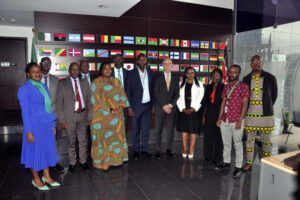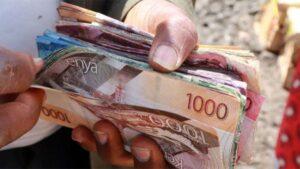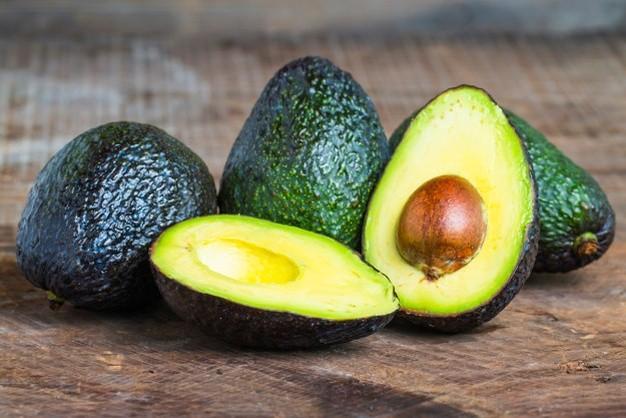- Kenyan Farmers Receive $2M Boost from Africa Fertiliser Financing Mechanism
- Brace for High Interest Rates for a Longer Period World Bank Warns Kenya
- Kenya-Ethiopia Trade Relations: Legislators Advocate for Policy Alignment to Boost Ties
- Visualising the state of debt in Africa 2024
- Abu Dhabi radiates optimism as over 300 startups join AIM Congress 2024
- TLcom Capital Raises $154 million in Funding to Boost Its African Growth
- Africa’s $824Bn debt, resource-backed opaque loans slowing growth — AfDB
- LB Investment brings $1.2 trillion portfolio display to AIM Congress spotlight
Browsing: Tanzania
As soon as East African countries restricted movements and public gatherings in response to the rising cases of Covid-19, perhaps owing to the scarcity of information on the pandemic, misinformation flew around social media platforms, causing an overload of fear across the region.
Kenya and Uganda were the first to take precautionary measures as Tanzania adopted a more relaxed stance towards the pandemic, which is being seen as a threat to Africa and the world. During this past week to date, Kenyans on Twitter and East Africans at large have been tweeting information about Tanzania, making it the fourth most trending topic in the world.
Furthermore, the US Embassy in Dar es Salaam, also came out with a statement indicating that “many hospitals in the main city of Dar es Salaam have been overhelmed in recent weeks, contends the risk of contracting Covid-19 there is “extremely high.”
This in turn …
There is no sugar in Tanzania. The little that there is, is very hard to come by and when you do find it, its many times more expensive than you would have bought it last month. It is barely a fortnight since the government confidently said the country has enough sugar and went ahead and placed a cap on sugar prices.
To bring things under control, nationwide crackdowns were carried out and several warehouses were found with allegedly hoarded sugar, fines were issued and arrest made in shops and other outlets where the sellers were price above the government cap, even awhile consignment was seized been smuggled out of the country.
Yet still, two weeks later, there is no sugar. Been the Holy Month of Ramadhan, lack of sugar severely affects the day to day social well being. Most of the staples and beverages need sugar, the tea needs sugar …
Did you know, last year (2019) Africa spent more money servicing debts than the amount it spent on health issues of its public? This obviously a general statement, it does not mean that each and every country in Africa spent more on debt servicing that the money it allocated to its health center, but the fact holds true for most of Africa’s 53 countries.
It is not that Africa does not care about the health of its people, on the contrary, its just that, according to World Bank stats, Africa is home to the World’s highest number of heavily indebted poor countries owing a total of USD 493.6 billion in long term debts.
As the World Bank and International Monetary Fund issue funding aid to help support Africa respond to the effects of the COVID-19 global pandemic, many African countries including Tanzania and Rwanda have asked that the international community …
Phase one of Tanzania’s Stand Gauge Railway (SGR) that extends from Dar es Salaam to Morogoro is almost complete.
The railway which covers over 300 kilometres is almost complete and the country is now getting ready to buy the trains that will run on the track.
Even though its first phase is not entirely complete due to the ongoing heavy rains that have stalled construction work, the country is ready to move on and buy and test the trains.
Unofficial reports say the government of Tanzania has started bidding for trains and is actually in the process of finalising procurement of at least two locomotives already. That’s not all, the required trains should have at least eight compartments for passengers and same number of wagons for cargo transportation.
Already the testing of trains has started, a senior official of the Tanzania Railway Corporation (TRC) intimated. It is expected that the …
The Tanzania Horticultural Association (Taha), is reporting an increase in revenue from the export of avocados which until now were not considered key export cash crop.
However growing demand in the US and Europe has seen the sub-sector increase revenue to USD 23 million annually.
Tanzania is the second largest producer of avocado fruit in Africa second only to Kenya. Over the past 5 years, avocado exports have frog leaped from 1,877 tonnes in 2014 to 9,000 tonnes in 2019 and were it not for the COVID-19 outbreak, this figure was expected to go only higher.
Kenya is already doing much better with its estimated annual output is about 190,000 tonnes every year as the country exports an average of 10,000 metric tonnes annually.
In Tanzania, there are about 10000 farmers of the crop who are spread out across the country and of these, now most have turned to the …
China has been funding a lot of Africa’s development especially in the past two decades and in that time, Beijing has loaned to Africa a whopping USD160 billion.
This debt burden is here to stay, and to stay for a long time, that is unless China is willing to forego or at least ease the terms of the loans. To put it in the words of the US Secretary of State Mike Pompeo;
“It is something that the African countries should consider, too, in asking China to possibly enter debt relief on some deals that have incredibly onerous terms that will impact the African people for an awfully long time, if relief is not granted.”
This should not be a problem for the runner’s up for World’s biggest economy, in fact China is among the world’s richest 20 countries which are known as the Great 20 or more …
The Impact of COVID-19 on agriculture value chains especially transportation logistics is immense. Economies must adopt, industries and sectors must find their own solutions to the bottlenecks in the agri-food supply chain.
Now that it is no longer business as usual, what makes up for robust food supply chains when borders are shut down? Will air travel cut prizes and yet break even in cross border food supply routes? What technological advances must we embrace in food production to bridge the growing supply gap? How can digital systems help speed up logistics integration in the transportation sector?
These are the questions that must be answered to charter the way forward for Africa’s food security and maybe even the World’s.
https://theexchange.africa/industry-and-trade/agribusiness/how-africas-122-million-mobile-banking-accounts-can-fund-agriculture/
While the COVID-19 crisis has brought to our door steps the largest challenge for food security of modern times; with lock downs, quarantines and logistics disruptions not to mention the …
No continent suffers worse food security issues than Africa, yet despite the high productivity coupled with disease and drought resistant capabilities of genetic modified organisms (GMOs), Africa has long been resistant to genetically modified food, be they crop or animal embryos.
While the average beef cattle in Africa, say the local Zebu weighs an average weight of a mere 250kg market weight, hybrid beef cattle like the Aryshire, weighs an average of 400kg, almost double the local African breed.
Instead of settling for 1 to 3 litres of milk per day from your local Zebu, you could get in excess of 10 litres of milk everyday from a hybrid Fresian, almost four times more milk.
Not only does the Aryshire beef bull and the Fresian cow produce more, they grow faster and when crossbred, they are even resistant to disease and bad weather. So why would food troubled Africa resist …
While all other agricultural exports are suffering reduced demand owing to the Covid-19 global pandemic, that is not the case for tobacco which has recorded remarkable increase in sales at the beginning of the marketing season.
Reports from Zimbabwe say export of flue-cured tobacco is stable and prices are firm, with tobacco sales having increased more than quadrupled over the cause of the last and the present season. Last season closed with sales of USD232 008 but this season has opened with sales of USD1 598 230 that is a 588 percent increase!
As market season opened at the start of the month, an impressive USD1.6 million was sold. With attractive prices that begun above USD 5 per kilogramme, farmers were more than willing to sell. Only three days after the marketing season opened, farmers had sold almost 700 000 kilogrammes of tobacco.
The country’s Tobacco Industry and Marketing Board …
The private sector is not responsive to the government’s stimulus package as banks report less than desired activities in borrowing. Even though huge fiscal and monetary measures have been taken by the Central Bank, still commercial banks are facing reduced demand on borrowing.
This is evident in weekly turnovers for Interbank trading which is down 92 per cent, the lowest it has ever been over the last decade. Money market analysis for the month of May reported that the Interbank Money Market (IMM) suffered its lowest activities since 2010.
You will recall that 2010 is just two years into the global economic recession that was triggered by among other things, poor lending habits by banks in the US that led to a collapse of the real estate industry.
Numerous banks had to be bailed out just to keep people in their homes as foreclosures were rampant across the country. The …












